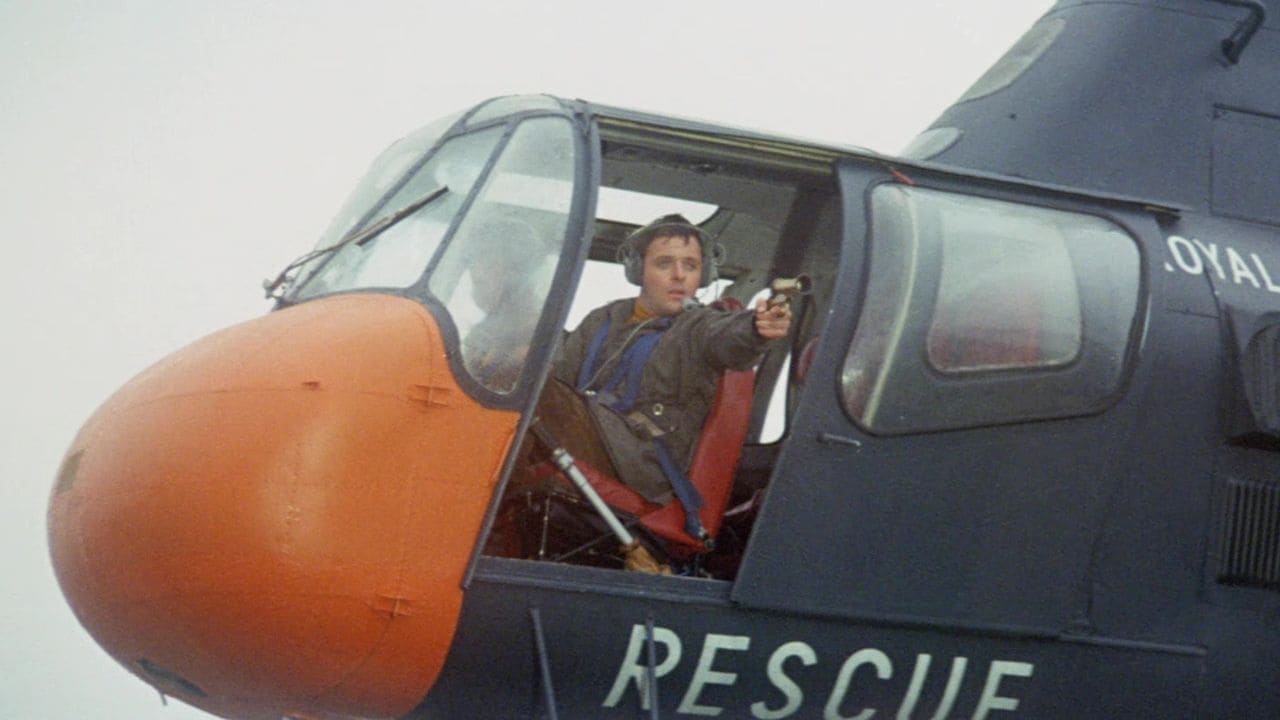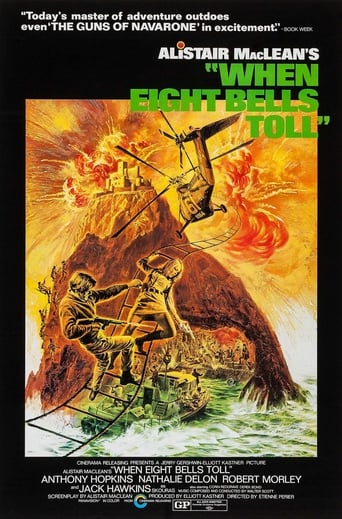

brilliant actors, brilliant editing
... View MoreAbsolutely the worst movie.
... View MoreIt is encouraging that the film ends so strongly.Otherwise, it wouldn't have been a particularly memorable film
... View MoreStrong acting helps the film overcome an uncertain premise and create characters that hold our attention absolutely.
... View MoreMeet Alistair MacLean's Philip Calvert. He's the Scottish response to Ian Fleming's James Bond and particularly specializes in secret agent assignments at the Irish sea and off the Scottish East coast. Apart from their areas of expertise, Calvert and Bond have quite a few things in common. They're both reckless adventurers with an attitude problem and an aversion towards authority. They're both good with the ladies and don't mind randomly killing a handful of nameless bad guys. Calvert is send out to investigate the disappearances of entire vessels carrying gold bullion. It seems like there's a well-organized crime network active in area, run by an international shipping magnate and relentless enough to kill whoever tries to interfere. "When Eight Bells Toll" is a very decent and entertaining action/adventure movie, just don't expect the same dazzling tempo, ingenious gimmicks or impressive stunts as you would in an actual James Bond film. This is a totally unpretentious action flick with a strong lead performance from Anthony Hopkins (even though he doesn't really have the action hero allures) and various terrific choices of location. The film benefices from excellent photography, courtesy of Arthur Ibbetson, and several of the extended suspense sequences keep you literally on the edge of your seat, like for example the drowning helicopter and the finale inside a watery cave.
... View MoreBetween OHMSS in 1969 and Diamonds are Forever in 1971 there was a chance that Bond would be retiring for good. The Rank Film Corporation figured that Alistair MacLean's maverick secret agent Philip Calvert would be the best to take his place.Obviously that didn't work out. Bond continued to prosper while Calvert faded into obscurity. You shouldn't count him out completely though as there is plenty of rugged and gritty thrills here in the vain of cold war thrillers that the high-key and glossy Bond films lack.However, a cold war villain or a madman wishing to take over the world ain't the antagonists here. A bunch of thugs hijacking ships and hiding out in a lonely port in the highlands are Calvert's enemies. Though I don't really care about such low-octane crimes and I failed to connect with the plot.Despite a touch of humour, some unusual scenery and the occasional tough guy moment there's just not enough of W8BT to get into. The film is over in 90 minutes and feels a bit rushed. I think it would have befitted considerably from a slower pace and an extra twenty minutes.Still, it's fun to see a young Anthony Hopkins doing the action hero thing, even if I have do damn clue what the title means.
... View MoreWhile adaptation of Alistair MacLean's books been popular few have been successful, and this is one of the less successful.Even with a great script (screenplay by MacLean) the film just doesn't take off, not least due to the fights and in various dark surroundings, where you really can't tell what is supposed to happen.Anthony Hopkins as the undercover man, and Corin Redgrave as his clumsy pal, works great, less sure about the bad guys. Robert Morley, as Hopkin's boss, is marvelous, and Leon Collins, as the shark fisherman, not bad at all.So great script, nice scenes from around Skye & Torbay, from the water, from the air and from land, buy much of the lighting and cinematography stinks! A film perfect for a remake!
... View MoreDuring the period since long distance travel became much more widespread in the 1950's, paperback thriller novels have become an increasingly important part of newly published friction. Before any long journey, we go into the bookstall in the airport, railway station or bus station from which we are departing and choose a paperback to keep us occupied during our journey. In many cases the choice is a thriller which is discarded on our return home. But before this how often have we seen a page at the end saying something like "Now to become a major motion picture starring.........." The coupling of paperback and movie versions of new thrillers has become increasingly important during recent decades. Over the years old writers have retired and new writers have built big reputations, but the process is ongoing. As soon as a successful new thriller appears in the bookstalls, movie studios compete to buy up the film rights. Not all the books for which film rights have been purchased actually finish up as movies but many of them do; so we now have movies, readily available for home viewing, which are based on novels from such highly respected writers of thrillers as Hammond Innes, Alistair MacLean, Tom Clancy and many others. In total these constitute a significant portion of the new movies that are now released each year. Alistair MacLean is credited by IMDb with 17 novels which have been filmed for either the cinema or television. It is reported that he was unhappy with the screenplay written for the earlier movies made from his novels and insisted on participating in writing the screenplay for all the later ones. "When Eight Bells Toll" was one of the movies for which he receives credits as both the author of the book and the writer of the screenplay. It is very interesting to find that several IMDb users have still been sharply critical of this film on the basis that much of it is too slow and spends too long in character development, leaving the action sequences too short and too far apart for the viewers interest to be fully maintained. In general I am not an enthusiast for movies made from thriller novels, which are usually a hybrid of who-dun-it and action sequences - the latter generally seem to involve gun battles or more basic hand to hand combats that are usually unpleasantly noisy, digitally enhanced to the point where they appear highly improbable, and far too lengthy in duration. I find that the prominence given to the shoot-out action sequences in such movies usually means that there is no time for gradually revealing the complexities of character that made the original novel interesting. In contrast to most of the other IMDb users who have commented on this film, this would be my chief criticism of "When Eight Bells Toll"; so my comments, or rating, would appear to be of little value to readers who have a different appreciation for this type of film. For me the most enjoyable parts of this film were the splendid photography of the Scottish west coast scenery, and some evocative sequences involving small craft handling which brought back many memories. Somehow the story never clicked although this film has a great cast and some very taut dialogue. I particularly enjoyed the interplay of character between Anthony Hopkins playing a very dour investigator, Corin Redgrave playing his sidekick, and Robert Morley who gives a great performance as their superior officer. Aided by its sharp, realistic and down to earth dialogue, most of the film was quite readily believable but unfortunately I did not find the final shootout in a concealed rocky inlet very convincing. As a film I would rate it somewhere in the middle of the scale, as a reasonably competent pot-boiler but no more. I am a great fan of Alastair MacLean's novels, but will not be rushing out to buy a videotape or DVD of any of the others that I have read, even if he was responsible for the screenplay himself.
... View More